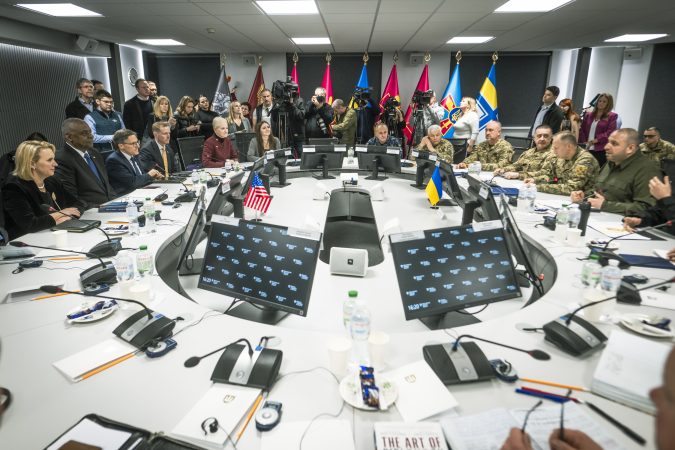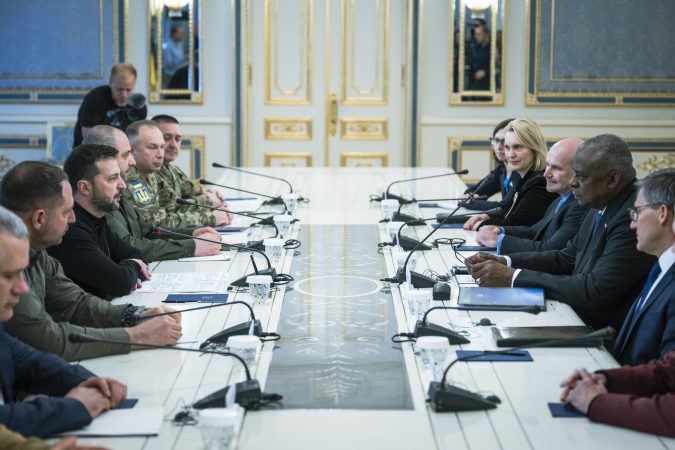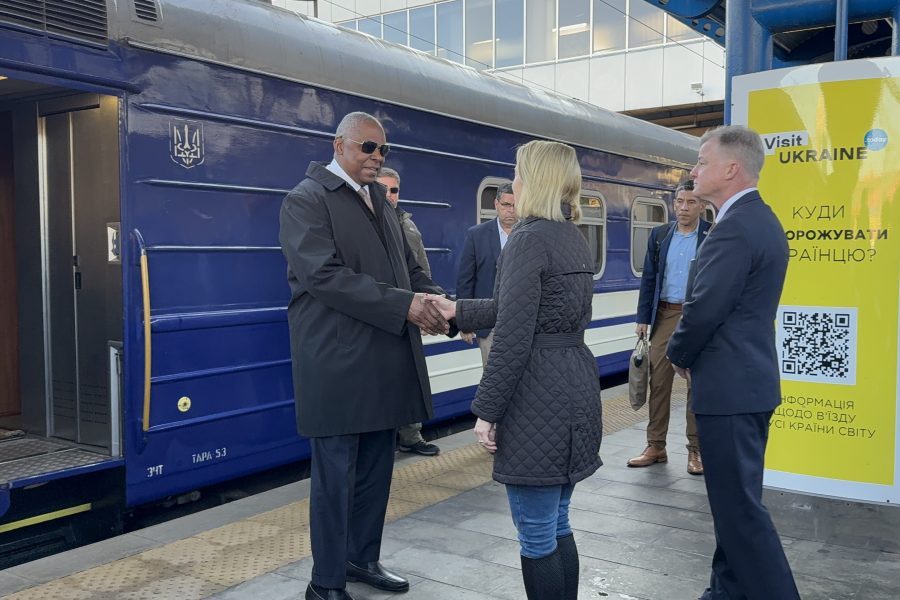KYIV—Secretary of Defense Lloyd J. Austin III huddled with Ukrainian President Volodymyr Zelenskyy on Oct. 21 and unveiled a $400 million military aid package to help sustain Ukrainian forces through a challenging winter.
The military support includes munitions for HIMARS rocket systems, artillery ammunition, mortar systems and rounds, armored vehicles, and anti-tank weapons.
But the U.S. move fell short of Zelenskyy’s appeal that the U.S. lift restrictions on American long-range ATACMS missiles and allow Ukraine to use them to strike targets inside Russia.
Air & Space Forces Magazine is traveling with Austin on his surprise trip to Kyiv. The visit is Austin’s fourth and likely last trip to Ukraine as Pentagon chief.
During a long meeting with Zelenskyy and top Ukrainian officials, Austin discussed the military situation Ukrainian forces face in the east, where Russian President Vladimir Putin’s armed forces have been grinding out gains while Ukrainian troops try to hold a small stretch of Russian territory seized near Kursk, Russia.
They also conferred over Ukraine’s efforts to recruit troops and regenerate its forces so Ukrainian forces can contend with their larger adversary, a U.S. Defense Department official said.
Zelenskyy and Austin spoke one-on-one for around 15 minutes, the official said, describing the talks as “freewheeling and open.”
A particular priority for Ukraine, which Zelenskyy has stressed publicly and privately, is acquiring more air defense interceptors, which have been all the more important as the war has devolved into a battle of attribution, both on the ground and in the air.
“During the meeting, we discussed critical defense priorities, including Ukraine’s air defense capabilities,” Zelenskyy wrote in a post on social media.
Russia has been attacking Ukraine’s energy grid, critical infrastructure, and troops with missiles, glide bombs, and drones, creating a wave of destruction just as winter approaches. As Austin stepped off an overnight train from Poland in Kyiv, the temperature was a few degrees above freezing, a reminder of the cold Russia aims to weaponize in the months to come. In the overnight hours before Austin’s arrival, Russia launched drones at the Ukrainian capital.
“We’ve been pretty consistent throughout saying that one of the key systems on the battlefield is air defense,” Austin said. “We will continue to push to get them the air defense systems and the interceptors that they need to protect their territory. It’s the second largest country in Europe, and so a big space to protect, a lot of cities and populated areas that they need to protect.”
Zelenskyy also has had to contend with American politics and sustaining political support in other countries in the West.
After an unsuccessful counteroffensive last year, Zelenskyy has offered a new “Victory Plan” in recent months, which calls for NATO to formally invite Ukraine to join NATO and frees the Ukrainian military to use ATACMS and other Western-supplied long-range missiles to strike targets inside Russia.
The Biden administration has declined to give Ukraine that latitude out of apparent concern that doing so could give Russia an excuse to escalate the conflict. Austin indicated no change is yet in sight. “We don’t have any change to our policy,” Austin told reporters before arriving here.
Former President Donald Trump has said that, if elected, he would swiftly negotiate a deal to end the war, but has not offered any details of how that would be accomplished. His running mate, Sen. J.D. Vance (R-Ohio), said in September that a deal could require a pledge of neutrality by Ukraine and the establishment of a demilitarized zone, but Ukraine’s leaders worry the arrangement would enable Russia to retain land seized during the conflict.
Austin also visited the Ukrainian Ministry of Defense. He was joined by U.S. European Command boss Army Gen. Christopher G. Cavoli and the head of Security Assistance Group-Ukraine, which runs a multinational coordination cell to provide equipment, training, and aid to Ukraine, U.S. Army Lt. Gen. Curtis A. Buzzard.
Their Ukrainian counterparts included Ukrainian Defense Minister Rustern Umerov, who was positioned around a circular table with Gen. Oleksandr Syrskiy, who commands Ukrainian forces, and other top officials, including the military spy chief and the minister responsible for defense production. Cavoli and Syrskiy also jointed Austin and Zelenskyy’s discussion earlier in the day.
Umerov promised updates on the “operational zone,” Army, Air Force, Navy, and defense production. The DOD official said the sides also discussed recruiting and retention with Zelenskyy and the military leaders. Zelenskyy signed a law in April to lower the conscription age to 25 to shore up manpower shortages.
“We have a good team from both sides,” Umerov said before the meeting.

Speaking to reporters before arriving in Kyiv, a senior defense official said that one point of discussion would be how Ukraine can use its resources against the Russian military’s larger mass to have a “concentrated effect.”
“Russia is not ready to call it quits and so that does place a steep burden on the Ukrainians to continue to field forces, to continue to train those forces, to employ vast amounts of equipment they’re receiving on a continual basis,” the senior defense official said. “It’s important for the Ukrainians to be able to take advantage of opportunities as they arise on the battlefield.”
During a speech at Ukraine’s Diplomatic Academy—yards from burned-out wrecks of Russian armored vehicles in the square outside—Austin sought to reassure the Ukrainians that the West would stand by them. “The Kremlin’s malice has not broken Ukraine’s spirit,” he said.
Austin also appeared to send a message to the U.S. public and Congress.
“For anyone who thinks that American leadership is expensive—well, consider the price of American retreat,” he said.



